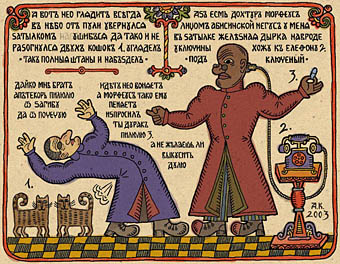 |
|
It is interesting that the nature of the opposition to Tsarist rule changed drastically between the times of Peter the Great
and the Revolution, from radical conservatism to radical progressivism. It is probable that this change happened
shortly after the Napoleonic Wars ending in 1814 with the introduction of Enlightenment ideals to Russia - mostly notably
embodied in the 1820 Decembrist uprising that sought to supplant the absolutist state.
However, in both instances the opposition to what is referred to as "old" orthography remains steadfast. There can be little
use for the continuation of complex spelling, went the thought, than to keep the masses in bondage. What greater expression
of solidarity with "the people," too, than the simplest rendition of their colloquial speech?
This opposition, seeking (nobly, I'll readily admit) was best represented by the glaring omission within lubki of letters
that were deemed "too difficult" for their places to be remembered by the laity. Thus, regardless of the purpose of the opposition,
letters like jat' and theta (fita), whose popularity was already waning, were dealt a heavy blow.
Thus, it cannot be very surprising that one of the first decisions of the Soviet government was to forcibly remove those symbols
of the Tsarist regime that had for so long kept illiteracy high and social mobility near stagnant. The future of the hated
letters is doubtful; as with lubki pictured below, it is possible that their sole purpose going forward will be as a passing
curiosity, as symbols of a decadent past...
|
 |
|
|
|
 |
|
Humor!
From "Hollywood Goes Lubki":

A lubok interpretation of the Matrix, including Neo's bullet-dodging, Morpheus connected to a landline, and the cat that reloads
as deja vu and warns the protagonists of danger.

A lubok rendition of the Terminator, replete with metallurgist's shop and forge (where the Terminator is eventually destroyed).
In both of these lubki, the orthography is randomly butchered, for the purpose of making the image look authentically
olden. And, of course, for a chuckle.
Source: http://www.hiero.ru/Akuaku/Lubki
There are lots of these!
Bibliography:
Bakhtin, Vladimir Solomonovich. Russkij lubok XVII-XIX vv. Moscow: Gos. izd-vo izobrazitelnogo iskusstva,1983.
Baldina, Olga. Russkie narodnye kartinki. Moscow: Molodaia gvardiia, 1972.
Boguslawski, Alexander. "Russian Lubok (Popular Print)." [Online]: http://www.rollins.edu/Foreign_Lang/Russian/Lubok/lubok.html.
Bukchina, B. Z., L. P. Kalakutskaia, and L. K. Chel’tsova. Pis’ma ob orfografii. Moscow: Nauka, 1969.
Drummond, D. A. and G. Perkins. Dictionary of Russian Obscenities. Oakland: Scythian Books, 1987.
Gvozdev, Aleksandr Nikolaevich. Izbrannye raboty po orfografii i fonetike. Moscow: Izdat. Akad. Pedagog. Nauk RSFSR, 1963.
Gvozdev, Aleksandr Nikolaevich. Ob osnovakh russkogo pravopisaniŽi`a; v zashchitu morfologicheskogo prinŽt`sipa russkoj orfografii.
Moscow: Izdat. Akad. Pedagog. Nauk RSFSR, 1960.
Ivanov, Evgenij Pavlovich. Russkij narodnyj lubok. Moscow: IZOGIZ, 1937.
Kalakutskaia, Larisa Pavlovna. Nereshennye voprosy russkogo pravopisaniŽi`a. Moscow: Nauka, 1974.
Kul’man, Professor N. O russkom pravopisanii. Jordanville, NY: St. Job of Pochaev Printing Shop, 1964.
Kuz'mina, Svetlana Maksimovna. TeoriŽi`a russkoi orfografii : orfografiŽi`a v ee otnoshenii k fonetike i fonologii. Moscow:
Nauka, 1981.
Kuznetsov, Andrej. Seriia: Lubki. [Online]: http://www.hiero.ru/Akuaku/Lubki.
Malevich, Kazimir S. Artnet Gallery. [Online]: http://www.artnet.com/artist/662569/kasimir-severinovich-malevich.html.
Ovsjannikov, I. Lubok: russkie narodnye kartinki XVII-XVIII vv. Moscow: 1968.
Peremilovskij, V. Novoe ili staroe pravopisanie? Jordanville, NY: St. Job of Pochaev Printing Shop, 1962.
"Peter I, czar of Russia." Columbia Encyclopedia Online. [Online]: http://www.bartleby.com/65/pe/Peter1-Rus.html.
"Risovannyj lubok." [Online]: http://alkonost.onego.ru/history/lubok.html.
"Russian Foundation for the Humanities." [Online]: http://www.extech.ru/s_e/found/nf/rgnf0.htm.
"Russkij risovannyj lubok kontsa 18 nachala 20 veka." [Online]: http://bibliotekar.ru/rusLubok/index.htm.
Shapiro, Abram Borisovich. Russkoe pravopisanie. [Moscow]: Izdat. Akad. Nauk SSSR, 1961.
Credit to the Tripod site for general page design.
 |